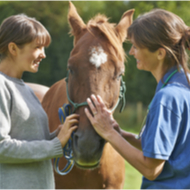Views sought on equine identification system

“An integrated system for equine ID across the UK is desperately needed" - Roly Owers, World Horse Welfare.
Equine charity World Horse Welfare (WHW) is calling on anyone interested in horses to take part in a new equine identification - or horse passport – survey, which it has developed in partnership with the British Horse Council.
The call comes after Defra launched a public consultation on proposed changes for improving equine identification and traceability in England. While WHW has welcomed the move, it is concerned that it does not cover the rest of the UK and that some people may not find the terminology user-friendly.
The simple simple survey takes just a few minutes to complete and aims to gather evidence on the current state of the system, which WHW will feed back into the consultation. It is open to anyone interested in Equine ID in the UK - but there are also specific questions for horse owners/keepers - and some questions will be dependent on where in the country the respondent lives.
World Horse Welfare chief executive Roly Owers said: “An integrated system for equine ID across the UK is desperately needed and this straightforward and accessible survey will allow horse owners, keepers or anyone else with an interest to have their say on this pivotal issue.
“Moreover, it will also deliver the evidence we need to persuade UK Governments to make the changes needed to deliver a system that is workable, enforceable and enforced. This is fundamental to supporting all of our equine health and welfare legislation.”
According to the organisation, maintaining an up-to-date database is critical not just for efficient legislation enforcement but also for disease control. It will also allow lost or stolen horses to be reunited with their owners, as well as make it simpler to identify and hold accountable those responsible for horses suffering from poor welfare.
British Horse Council chair David Mountford said: “Defra’s consultation gives us a once-in-a-lifetime opportunity to make our voices heard regarding how we manage our horses’ information in the future. It is quite long and technical though, and for the 750,000 busy horse owners in the UK, we’ve made it even easier to share your views.
“The current ID system simply isn’t fit for purpose, with over 50 per cent of the data on the Central Equine Database – which is meant to hold up-to-date information on all horses in the UK – inaccurate or incomplete and changes need to be made.”
To participate in the survey, visit smartsurvey.co.uk/s/HORSEPASSPORTS



 The WSAVA has invited veterinary professionals to a webinar on responsible antibiotic usage in dentistry.
The WSAVA has invited veterinary professionals to a webinar on responsible antibiotic usage in dentistry.